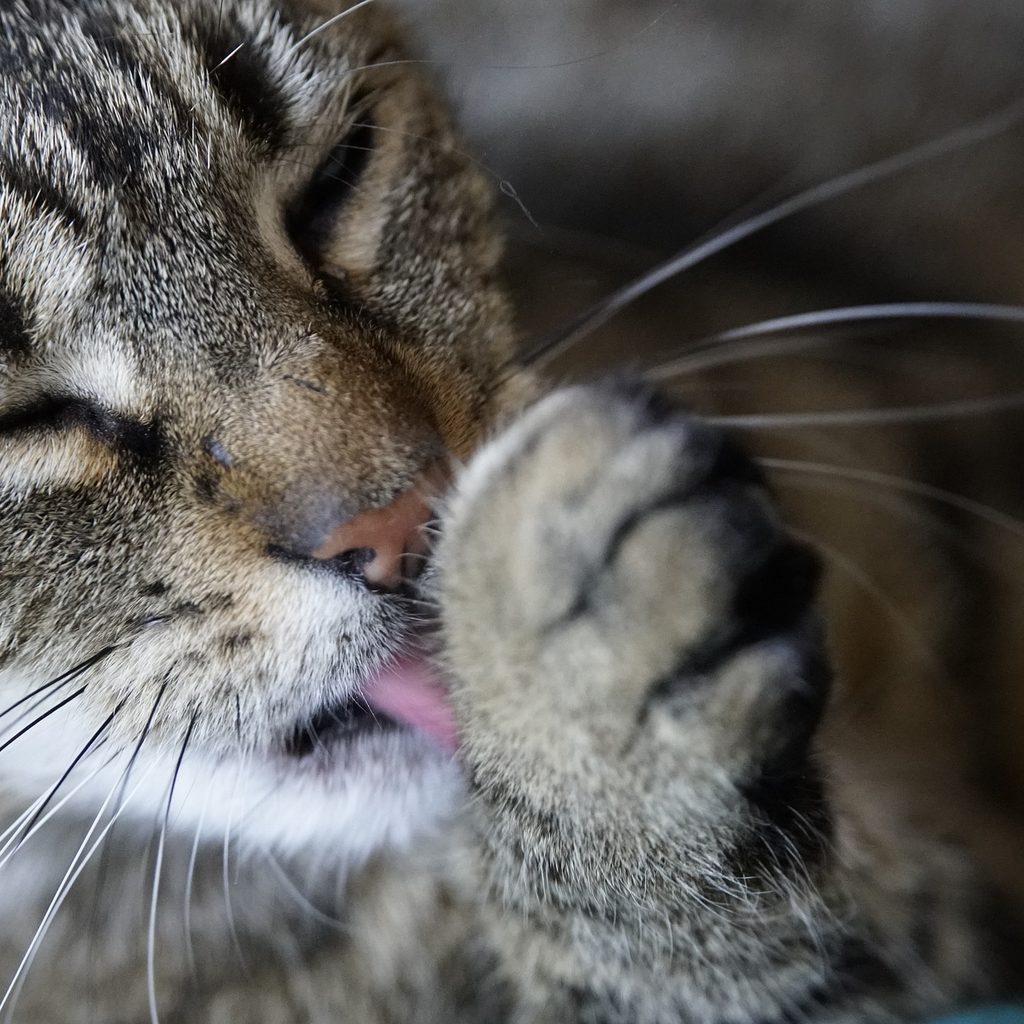After you’ve eaten a meal, you probably want to stretch out, relax, and maybe loosen your belt a notch. But when your cat has finished eating a meal, he wants to take a bath right away. You’ve probably noticed your cat grooming himself — particularly his face and head — after eating, and he probably does this regularly. The good news is that this is a perfectly normal behavior for cats. But why do cats clean themselves after they eat? Understanding the instincts that are driving this behavior can help you better understand your cat’s need to groom himself.

Safety instinct
At the most basic, your cat’s natural inclination to groom himself stems from a safety and survival instinct. In the wild, cats needed to protect themselves from predators. A tasty meal that they’ve just enjoyed could attract a predator, especially if that scent remains on the cat after eating. As a result, cats naturally understand the importance of thoroughly grooming themselves after a meal. The process removes any residual scent of food and helps avoid attracting any predators.
While your indoor cat may be safe from predators, his instincts still tell him to clean up after a meal, so that’s one reason why you might notice this behavior.
Cats like to be clean
While grooming after a meal serves a safety purpose, your cat’s natural instinct to be clean can also motivate this behavior. Cats naturally like being clean and dry, and let’s face it: Eating can get messy.
After a meal, your cat might feel unclean and might decide a bath is in order to fix the issue. Staying clean is beneficial for cats in multiple ways. By frequently grooming himself, your cat can help prevent mats from forming, which can keep his coat and skin more comfortable and healthier. Grooming can also prevent skin irritation and other health issues, so your cat is protecting his health, too.

When grooming becomes excessive
While it’s normal for your cat to groom himself after a meal and periodically throughout the day, that behavior can become excessive in some instances. “Overgrooming” refers to the process of your cat grooming himself so much that he creates bald patches on his body. You might notice that your cat suddenly spends excessive time grooming, or that the number of grooming sessions per day increases so that the behavior is almost constant.
If your cat is overgrooming himself, it could be for several reasons. In some cases, your cat is responding to being increasingly itchy, like in the case of an allergy or a flea infestation. This itchiness prompts his increased grooming, and to solve the grooming, you’ll need to address the cause of his itching.
Some cats also overgroom in response to stress. You may need to consider the changes that have occurred in your cat’s life recently. A move to a new home, the birth of a baby, or the addition of a new pet to your home could all potentially create the stress that prompts overgrooming. You may need to take some steps to help your cat feel more secure and comfortable in the home again. This might mean separating him from the new pet, giving him a space, like a cat tree or a room of his own, where he feels safe, and taking other steps to build up his confidence.
If you suspect that your cat is overgrooming, it’s best to start with a trip to the vet. Your vet can examine your cat thoroughly to identify any potential physical causes behind the behavior. Then, you can work to relieve your cat’s need to overgroom so his hair can start to grow back.
Most cats will naturally take some time to groom themselves after finishing a meal. Your cat might go straight to grooming while he’s still by his food dishes, but many cats will instead go find a comfy space before they begin their grooming session. This grooming serves important purposes, including removing any scent of the food and keeping your cat’s coat clean and healthy. While it’s definitely important to keep an eye out for a situation where this grooming turns excessive, in most cases, your cat is just following his instincts to keep himself healthy and safe with a good after-meal grooming session.



